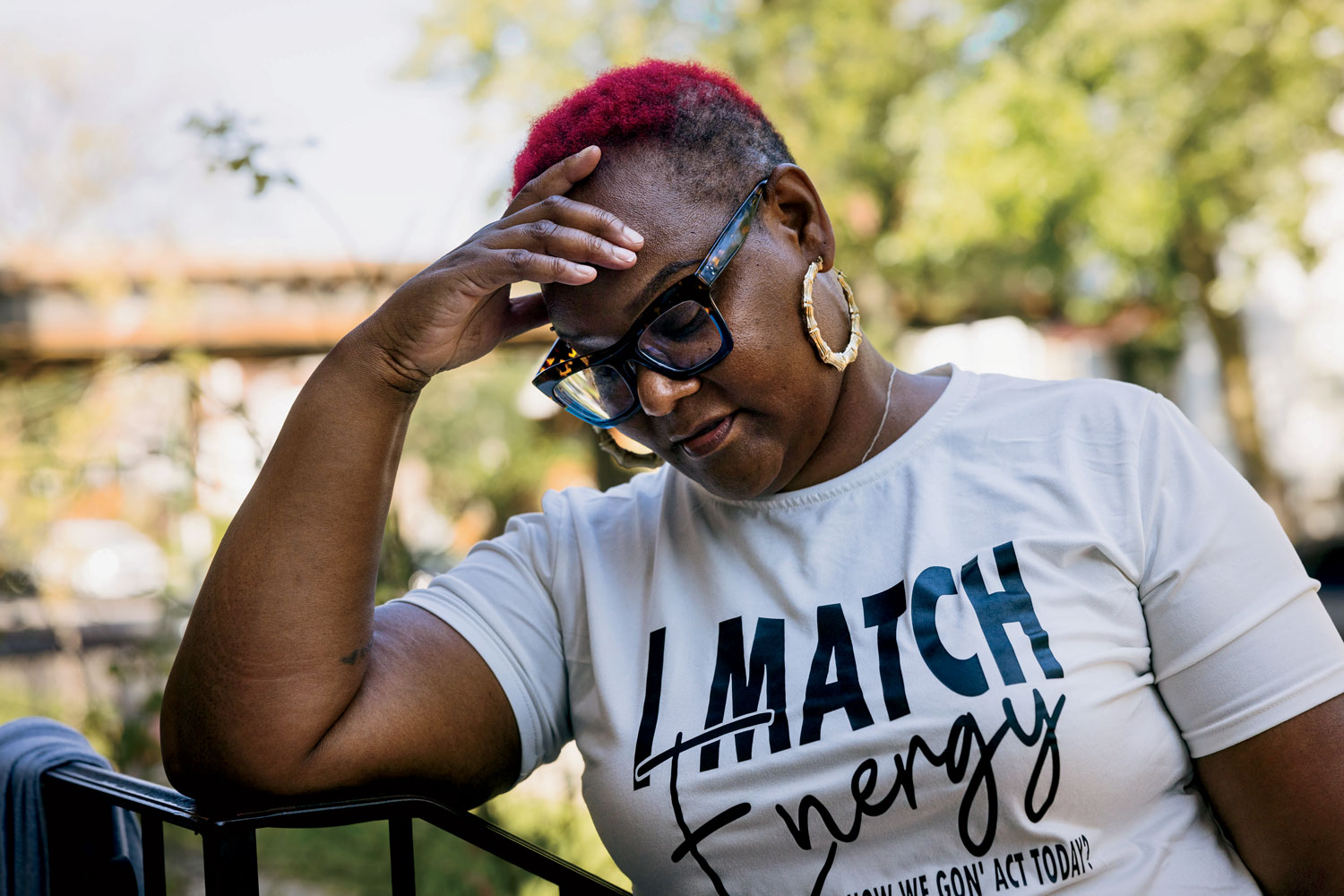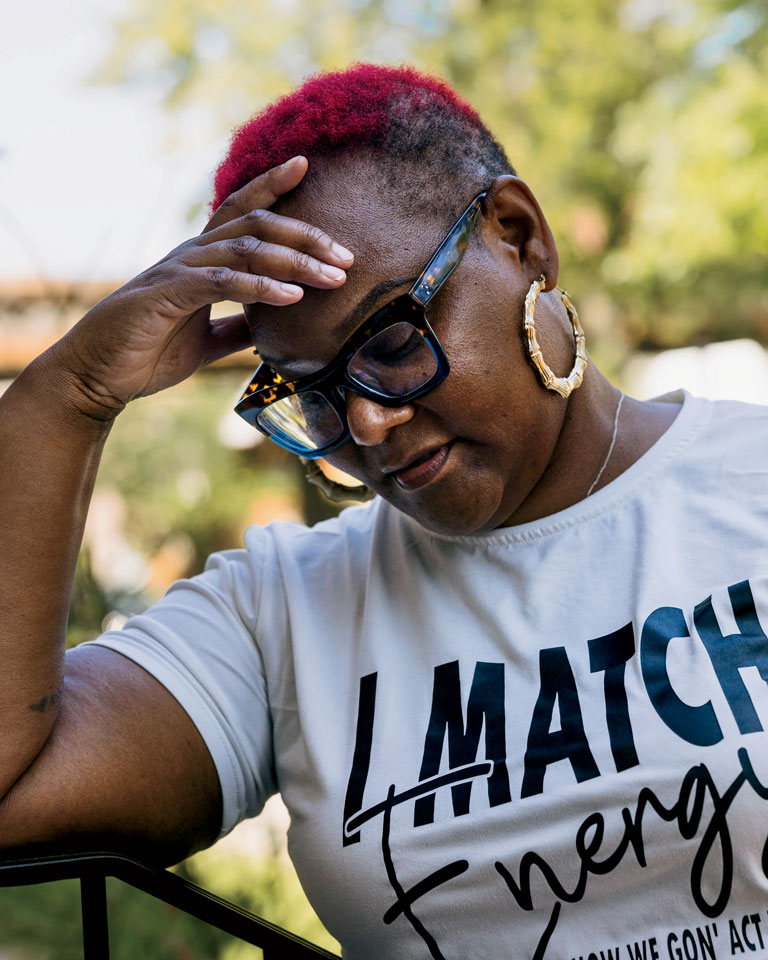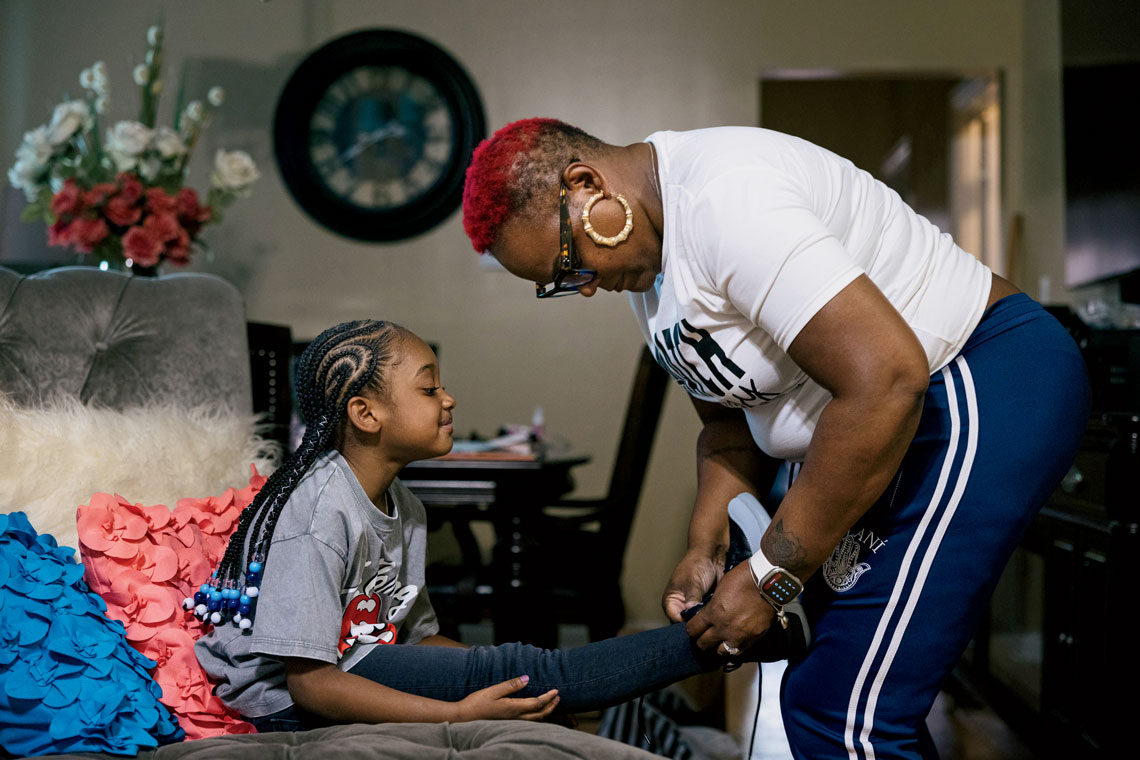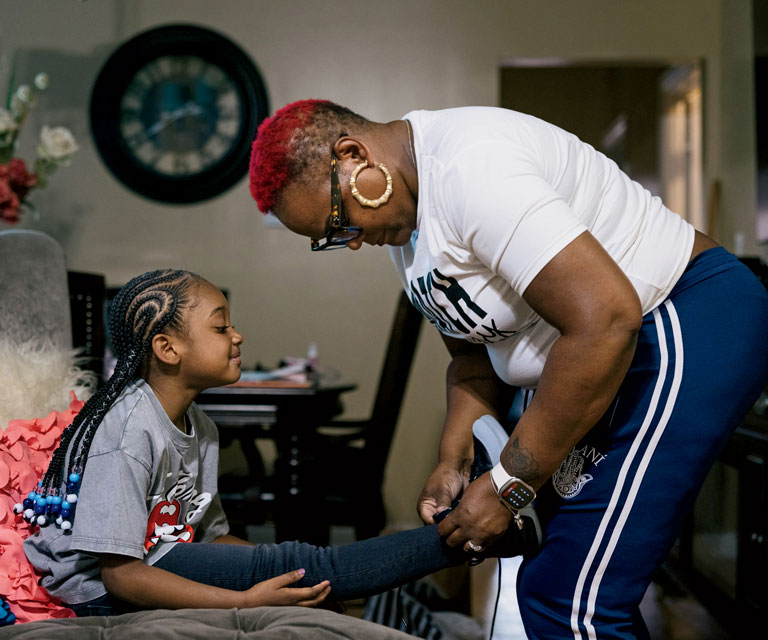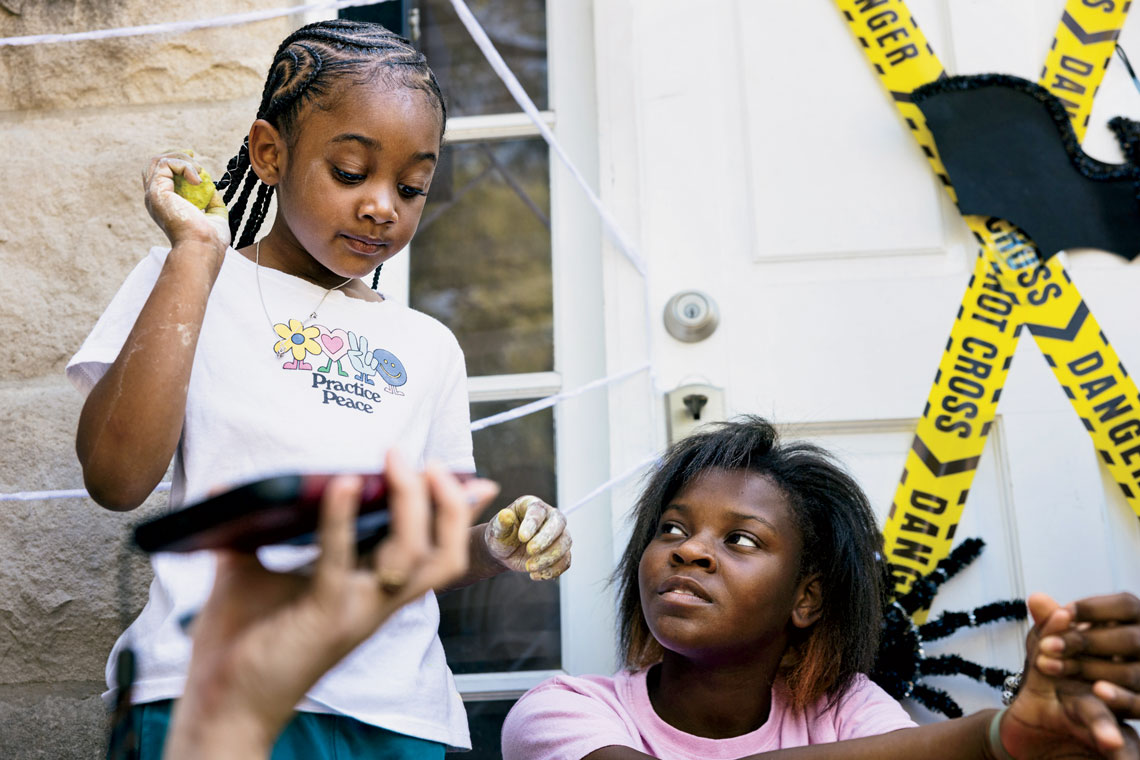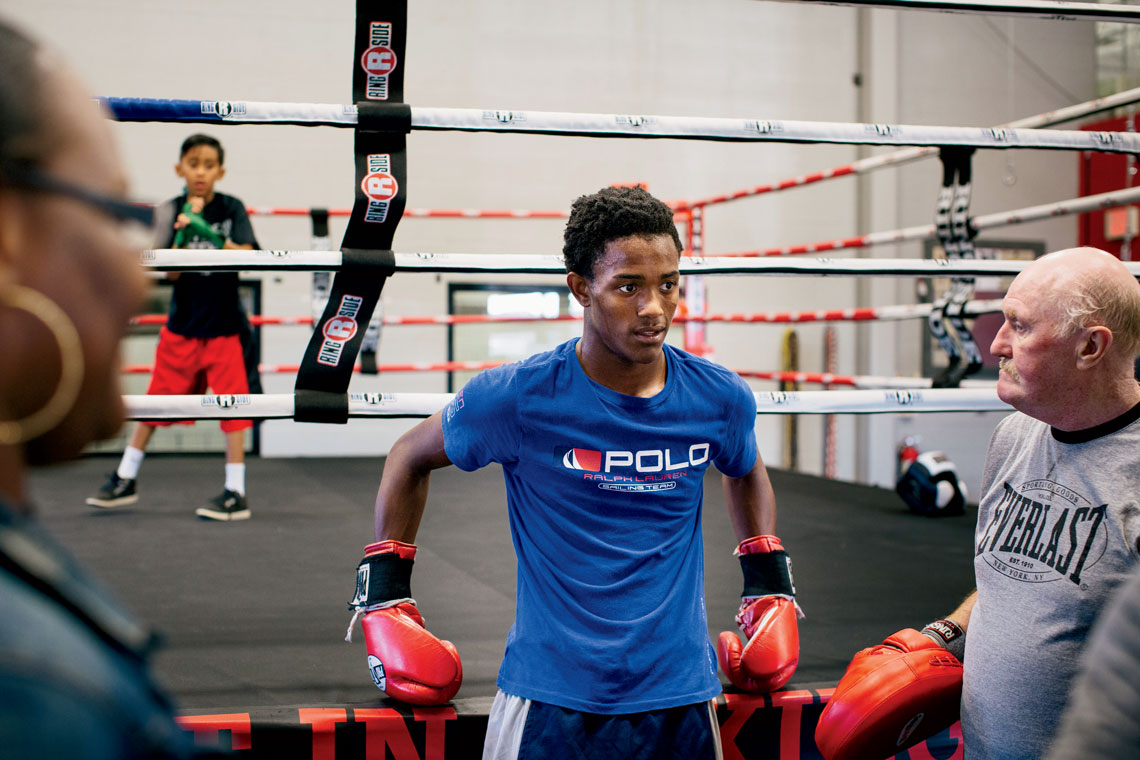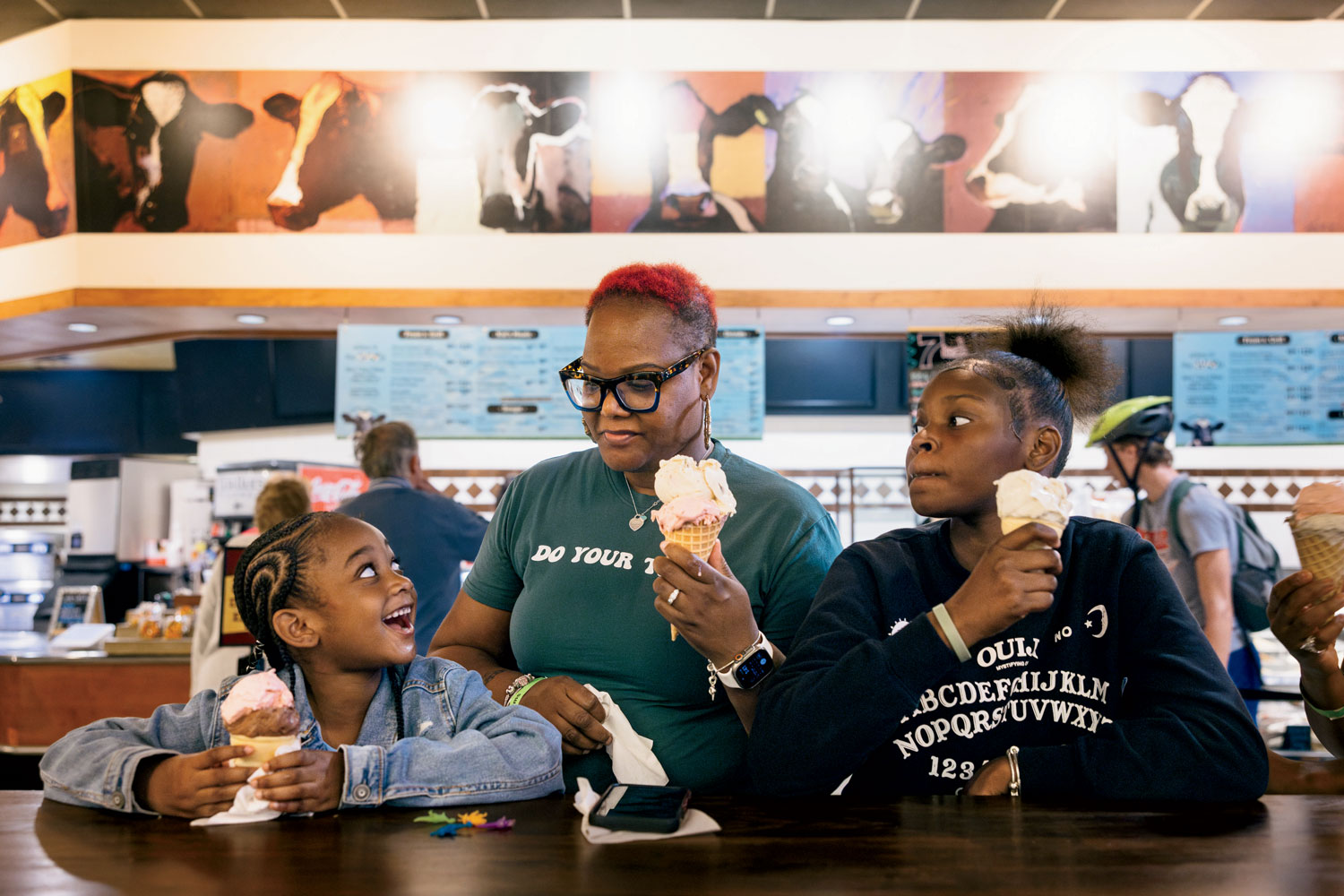Chrishona Hodges eyes her cellphone, waiting for the black square on the screen to come to life. For the moment, she can see only herself — the oversize tortoiseshell glasses that frame her face and the large, gold hoops that catch the light and jangle as she weaves her way through Jewel-Osco. Holding her phone in one hand, pushing a shopping cart with the other, she moves hurriedly, hoping to make up time. She lost three hours earlier in the day sitting in the waiting room at Cook County Jail, only to find out her visit had been canceled because of short staffing.
Her phone lights up. It’s the video call she’s been expecting from her son Jerryon Stevens. He’s wearing a tan jumpsuit over a white undershirt. His twists fall just below his shoulders. The sizable red tattoo on his cheek of a script W, an homage to a slain friend, is muted by the slightly blurry feed. He sits in a blue plastic chair, his hands cuffed behind his back.
Chrishona smiles when she sees her boy. The jailhouse setting doesn’t jar her; she’s witnessed versions of this for the past three years.
“Hey, Ma,” Jerryon says, looking down at the screen in front of him.
“Happy birthday, Mank,” she cheers, using the family nickname for Jerryon.
Soon several other family members join the call, their attendance announced by the familiar Microsoft Teams ding. They dial in from different cars, all of them making their way to Humboldt Park, where, despite Jerryon’s absence, they plan to celebrate his 24th birthday on this May evening. The call has become a jubilant, chaotic reunion.
“Mank, look what kind of cake I got you,” says Chrishona. “Strawberry shortcake.”
“I don’t like no strawberry shortcake,” Jerryon cracks.
Chrishona ignores the complaint. “And I got some chicken and cornbread,” she continues.
“Y’all gonna have a party over there.”
Chrishona is now in the parking lot. A foreboding gray cloud inches across the Creamsicle sky. When she opens her car door, she pans her phone across the cabin so Jerryon can see his aunt, cousins, and sister and his 5-year-old daughter, Malani.
“Stank,” Jerryon says to Malani with a smile, craning his neck toward the camera for a better look at her. “What’s up? You grown.”
Malani recently had her hair braided for the first time, and Jerryon is still adjusting to her sophisticated new look. The girl smiles shyly, her face obscured by the back seat shadows. Jerryon asks her if she’ll sing him “Happy Birthday.” She remains mute, but after several attempts, Chrishona conducts a spotty group rendition, sung in no fewer than three keys. Even Malani joins in.
Chrishona heads to the home of her mother, Jackie Hodges, letting the others talk to Jerryon as she drives. By the time she arrives and plops down on a sofa, only two minutes of the allotted 30 remain. Everyone but Chrishona has signed off.
“Hey, Ma, you there?” asks Jerryon.
Chrishona takes off her glasses and wipes her eyes. “Yeah,” she answers after a pause, her voice faded, as if someone turned the volume down. “I just wish you was here.”
Jerryon reassures her that he should be home soon. It’s a refrain he repeats often, seemingly both for Chrishona and for himself. Just then, a guard tells Jerryon his time is up. In a matter of seconds, he’s gone. Chrishona sinks into the cushion and cries.
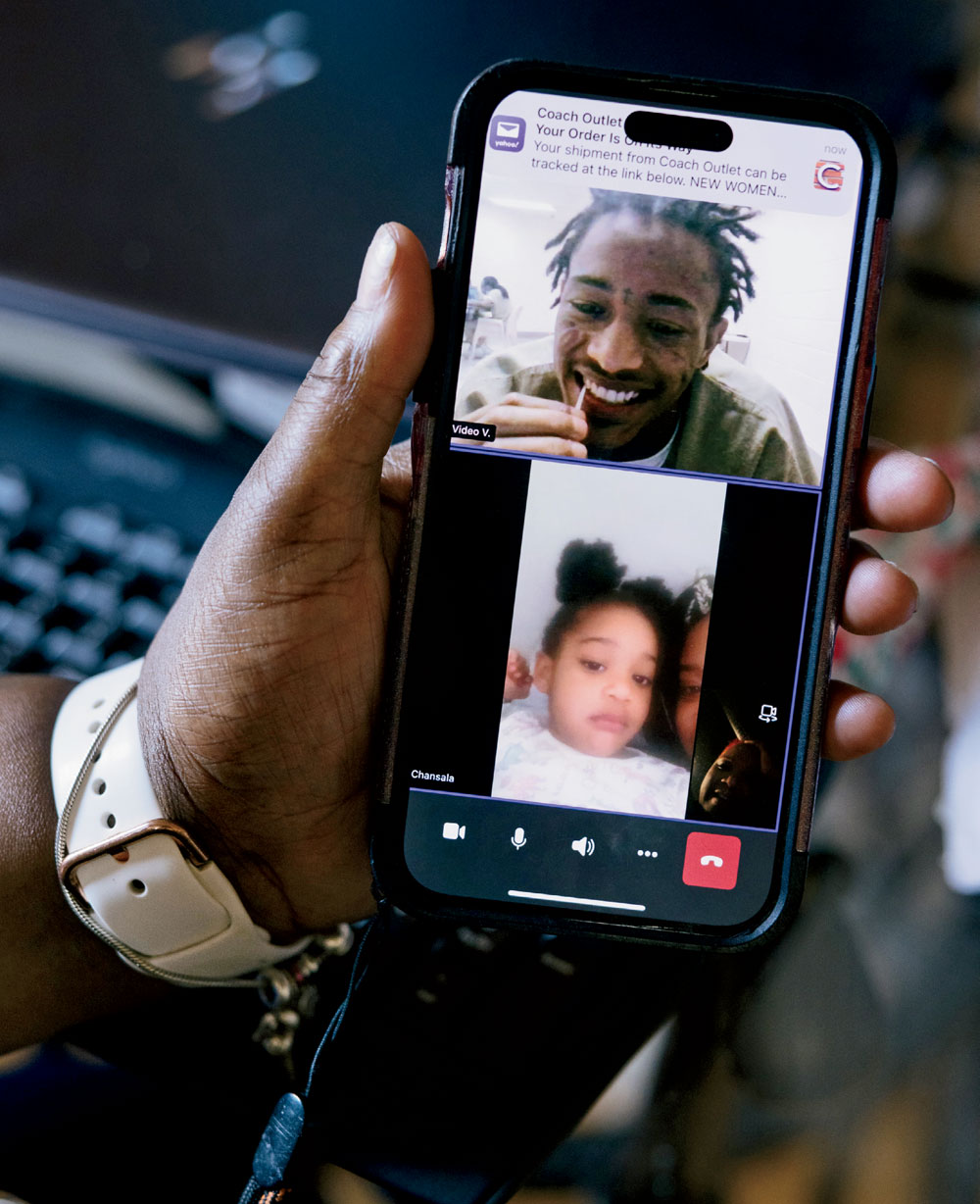
I met Chrishona in 2016 while working on a story for Chicago about Jerryon. He was a sophomore at Orr Academy High School at the time. I had decided to profile him as an example of a young man at an inflection point in his life. A former straight-A student, he had fallen in with a gang in his neighborhood of Humboldt Park and had started selling dope. He was awaiting sentencing on two felony drug convictions. I was interested in exploring what was personally at stake for him, but I also wanted to understand how his choices were influenced by the pressures of living in a struggling community on the West Side.
He’d grown up in a house full of women. Three generations of men in his family had been incarcerated or killed. Jerryon’s father, a thrice-convicted felon, spent most of the boy’s life in and out of prison. Jerryon himself was a smart, big-personality kid who was close to his relatives and fiercely loyal to his friends. But he was also insouciant about his future.
Back then, Chrishona was spending an inordinate amount of time trying to track down her son’s whereabouts as he ran the streets. The most common refrain I heard in the months I spent with Jerryon and his family: “Where’s Mank?” His mother worried constantly that her son might end up in prison or worse.
In the years after that story was published, Chrishona would occasionally share updates with me about her three children. Jerryon’s older brother, Jacques Williams, attended Northern Illinois University for a year before joining the navy. And her youngest, Ja’Ziyah, a zany 3-year-old with energy to burn when I first met her, excelled in school and gymnastics. In 2019, Chrishona married her longtime boyfriend, Ja’Ziyah’s father, and moved their blended family into a townhouse in North Lawndale. Jerryon’s world, however, proved more fractured, unfolding in the borderlands between street life and jail.
In June 2021 came devastating news: Jerryon had been charged with murder for his alleged role in a West Side shooting. Several local outlets reported his arrest with headlines like “Man Once Featured in Chicago Magazine Profile Charged in East Garfield Park Murder.” The mug shot that accompanied the stories was a shock: Jerryon looked so different than he had the last time I saw him. His eyes were stony, and he had several new face tattoos, including a cross between his brows and one on his forehead that spelled “Chrishona.”
I reached out to Chrishona in the days following Jerryon’s arrest, telling her how sorry I was to hear the news. We exchanged a few texts over the next couple of years and started talking more regularly again in the summer of 2023. By then, Jerryon had been in jail for two years, awaiting trial. He’s still waiting. In the meantime, his daughter has grown from a toddler to a girl, and at least 13 of his friends have been killed, Chrishona estimates; others have started families of their own. All while Jerryon, only newly an adult himself, stagnates in his cell, suspended in time.
When I first connected with Chrishona in person again, we both ended up in tears. Now that I’m a mother myself, Chrishona’s struggles hit me in new and personal ways. As we discussed Jerryon’s life in jail, Chrishona kept repeating one word: “irritates.” It irritates her that her 24-year-old son will disappear for days or weeks when he is put in solitary confinement for fighting. It irritates her that he is languishing behind bars for years simply awaiting trial. And it irritates her that if convicted, he could spend decades in prison.
Despite the relentless hardships, Chrishona still holds her family together, keeps Jerryon connected to his daughter, and fiercely cultivates joy — not just for herself, but for everyone around her.
“Incarceration reverberates through the family system,” says Reuben Jonathan Miller, a professor at the University of Chicago Crown Family School of Social Work, Policy, and Practice. His research on mass incarceration earned him a MacArthur “genius” grant in 2022. “It’s more than emotional. There are jobs you might avoid because of the hours you need to be available for calls. Loans you take out to pay for legal bills.” The list goes on. “Families experience their own collateral consequences — their own form of incarceration.”
Over time, the impact of cumulative stress can be profound. Research shows that those with loved ones in prison suffer higher rates of heart attacks, strokes, and heart failure. Chrishona, 44, already sees the fingerprint of stress on her medical charts. She’s had to take several leaves of absence from her remote job as a patient access advocate with Endeavor Health because of high blood pressure. And her arthritis has been acting up, too. “At the end of the day, mothers are sitting with the weight of their child’s health as they sit inside cells,” continues Miller. “They bear that burden.”
For Chrishona, the toll of Jerryon’s incarceration takes many forms. There’s the money, for one. To raise $25,000 for a lawyer to represent Jerryon, she had to borrow from her siblings and cash out some of her 401(k). She’s also spent thousands of dollars more for phone and text communication with her son in jail and for deposits for him in the prison commissary. Then there are the hours spent consoling Jerryon and passing along his messages to friends and family he cannot reach directly. The sleep lost from worrying about Jerryon’s mental health. The time spent splitting childcare with Jerryon’s ex-girlfriend to help raise Malani, who calls Chrishona “Ma.” And all the while, there are the ever-accumulating painful moments that rise up when she feels her son’s absence most sharply: an empty house, missed birthdays, holidays without him. But despite the relentless hardships, Chrishona still holds her family together, keeps Jerryon connected to Malani, and fiercely cultivates joy — not just for herself, but for everyone around her.
Chrishona’s reality reflects a staggeringly common one: In the United States, one in four women have a loved one behind bars. And for Black women, that number jumps to one in two. That means more than 42 million women, and 10 million Black women, in America are currently drawn into the punishing ambit of the country’s carceral system — 42 million women left with just the blurry contours of a person, a pixelated face on a screen.
“You straddle the fence between two different worlds, the unfree world and the free world,” says Keeonna Harris, an activist and researcher who is chronicling her own experiences with mass incarceration in a forthcoming memoir. “Women are often left out of the conversation because we ourselves are not the ones in prison, but prison doesn’t just punish one person.”
As long as Jerryon sits behind bars, Chrishona feels trapped, too.



